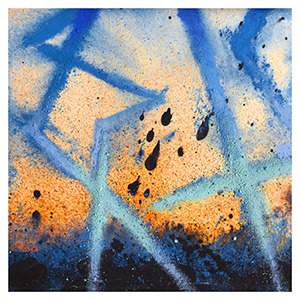Call Super Suzi Ecto
Call Super (a.k.a. Joe Seaton) isn’t someone who makes things easy. That’s not to say […]

Call Super (a.k.a. Joe Seaton) isn’t someone who makes things easy. That’s not to say that his music is overly difficult or challenging; it’s just that in an era where artists are largely expected to share every influence and willingly explain specifically what they’re trying to communicate with their music, Seaton is content to leave things purposefully vague. Obviously, he’s not alone in this, as the ranks of “anonymous” producers have swollen to a point that’s nearly comical. But Seaton takes a different approach. His face, name, and the key points of his biographical resume are all easy enough to find online, but it’s also apparent that he’s set limits as to exactly how much he’s willing to reveal. In our Bubblin’ Up profile of him last year, Seaton said, “I like that old-fashioned view of people who make electronic music, not hiding behind masks or anything, but just keeping people guessing… I think you should have the freedom to present stuff as a blank canvas, so that when people see you they don’t necessarily know what they’re going to get.” When he put together an XLR8R podcast a few months later, the Berlin-based Brit certainly did his part to maintain that idea of a blank canvas as best he could, purposefully listing nonsensical titles for a few of the tracks instead of submitting a complete tracklist. In the wake of that, it came as little surprise that the announcement of Suzi Ecto, his debut full-length, was accompanied by a dense, poem-like screed in lieu of the usual array of promotional language.
What is surprising is the actual music on the LP, which often finds Seaton abandoning the dancefloor in favor of precision-sculpted pieces that are more focused on sound design than any sort of discernible groove. In an interview that appeared last week on The Quietus, he emphasized that paranoia was one of Suzi Ecto‘s key themes and motivating factors, but that doesn’t necessarily come across in the album’s 11 tracks. The LP may not be a jubilant listen, but there’s no discernible sense of dread, either. In fact, Songs like “Dovetail” and “Sulu Sekou” are downright serene, the latter in particular sounding like an inventive take on the sounds one might hear at a high-end Japanese spa. (The song’s wandering clarinet passages, which were apparently provided by Seaton’s father, also provide a wonderfully relaxing touch.) Along those lines, the twinkling tones of “Fold Again at Last” are pleasantly hypnotic, while the druggy “Raindance” brings to mind some sort of otherworldly, late-night drum-circle jam session—in a good way, as hard to believe as that may be.
Listening to Suzi Ecto, the most remarkable thing about it may be how little techno actually resides on the album. Admittedly, Call Super’s past efforts, especially his releases for Houndstooth, have always been more nuanced and multifaceted than the average techno 12″, but those records at least paid lip service to the idea of music for the club. On Suzi Ecto, the ominously crackling “Hoax Eye” is really the only track with serious dancefloor aspirations. Beyond that, Seaton seems content to explore other ideas, and to his credit, the results are rather impressive. “Okko Ink” might be the album’s weirdest offering, its alien rhythms blending nicely with an assortment of synth swells, buzzing tones, and more bits of live clarinet. Another standout is album closer “Acephale I,” which trods along gloomily for several minutes before noisily pivoting into a melodic finale that references “Acephale II,” the b-side of his last Houndstooth 12″.
On the whole though, Suzi Ecto isn’t an LP that can be properly evaluated based upon the merits of any one track. What makes it such a powerful effort is its aesthetic cohesion; there’s a unified feel to the music, even as Seaton continually plays with various rhythmic ideas and melodic patterns. It’s hard to pinpoint exactly what ties it all together, but the “omnipresent crackle and hiss” that Philip Sherburne cited in his review for Pitchfork is probably a good place to start. Suzi Ecto may be an impressively orderly creation, but its music certainly isn’t clean. And while the embrace of noise and distortion has become commonplace within the current techno landscape, Suzi Ecto never comes across as amateurish or lo-fi. Seaton’s use of what Sherburne refers to as “metallic locust buzz” is a very conscious one, yet his pinpoint implementation prevents things from becoming murky, or even messy. Early Aphex Twin is perhaps too obvious of a reference point, but Seaton’s dedication to sound exploration and song construction creates a clear parallel between Suzi Ecto and the best of Warp Records’ classic ’90s era. At their best, artists like Autechre, Squarepusher, and Plaid were evaluated in terms of creativity, not dancefloor functionality, and Suzi Ecto makes it clear that Seaton would like his work to be similarly free of restrictions. He wanted to be seen as blank canvas, and after delivering such an excellent debut album, it’s appears that he’s got his wish.

